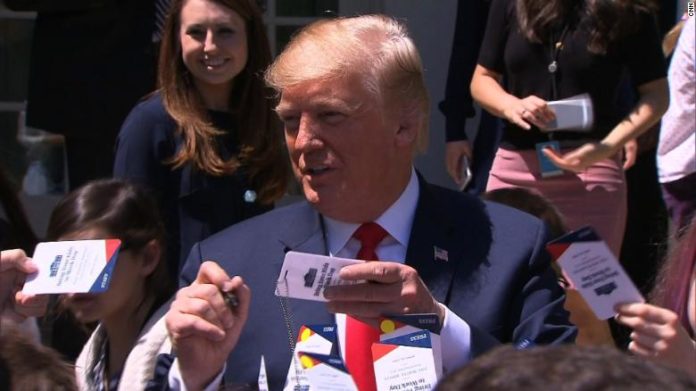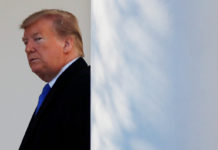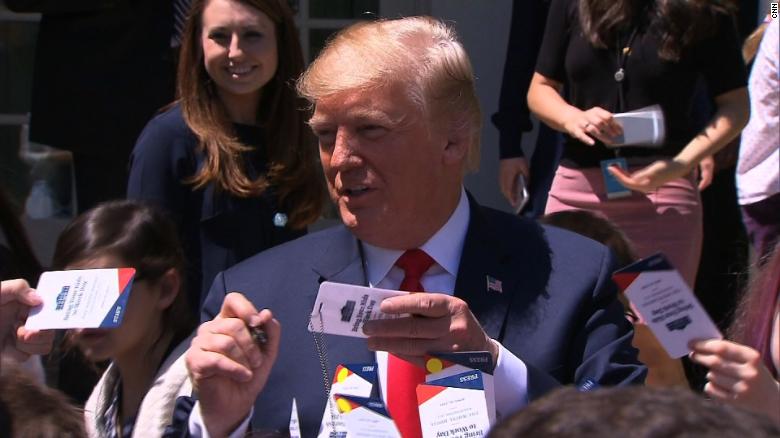
(CNN)Dr. Ronny Jackson exuded confidence when he emerged from a Capitol Hill office Tuesday evening, telling reporters that he looked forward to answering tough questions from lawmakers about his past.
By Thursday morning, Jackson was back in the White House basement, returning to his job as the President’s physician after his nomination to become the next Veterans Affairs secretary was scuttled.
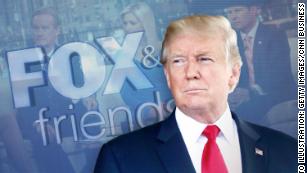
In less than 48 hours, Jackson was downgraded from a well-respected physician who served presidents from both parties to the latest casualty of Washington’s scandal machine. Not since former President George W. Bush’s 2005 attempt to elevate Harriet Miers to the Supreme Court has a high-level nominee been so thoroughly humiliated in the confirmation process.
But the process was especially ugly — and swift — for Jackson. His downfall was fueled by a laundry list of serious, but uncorroborated, allegations from nearly two dozen current and former colleagues that ultimately came together in a memo released by Senate Democrats with, according to sources, the tacit approval of Republicans.
This account of the final hours before Jackson withdrew his nomination Thursday morning is based on more than a dozen interviews with lawmakers, administration officials, congressional sources and veterans’ groups. It depicts Jackson’s surprise path to the nomination, the bipartisan concerns about the White House physician’s conduct and the Trump administration’s mad scramble to salvage a nomination that was, in many ways, plagued by self-inflicted wounds.
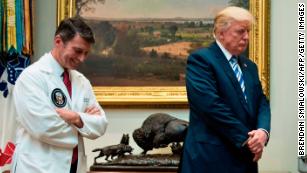
The interviews show that 15 months after taking office, the Trump administration is still struggling to professionalize its nomination process to ensure vetting is taken seriously and lawmakers on Capitol Hill are prepared for any surprises.
“We did him no favors,” a White House official said Thursday, acknowledging the administration did not fully appreciate the magnitude of the task and the campaign that would rise up against Jackson’s nomination.
Jackson’s selection as the nominee to succeed embattled former VA Secretary David Shulkin came as a stark surprise to him late last month when the President summoned him to the Oval Office and asked him to take on the task of leading the sprawling agency. Jackson knew about the decision only a day or two before it was made public, an official said, a sign that inadequate vetting had taken place.
On Capitol Hill, lawmakers in both parties openly questioned the President’s decision to tap Jackson, one largely made out of personal affinity, and were skeptical that he had the experience to lead an agency that is known as a management boondoggle.
It wasn’t Jackson’s background that initially worried White House chief of staff John Kelly and others in the West Wing, but rather his lack of experience for the job. Kelly gently argued against the Jackson pick, an official said, but the President’s mind was made up — and there was no obvious and immediate alternative.
After the White House officially sent his nomination to the Senate, Jackson appeared to be doing all the things a Cabinet nominee would typically do. He met with lawmakers privately to answer questions and submitted routine paperwork to the committee of jurisdiction, in this case the Senate Committee on Veterans Affairs.
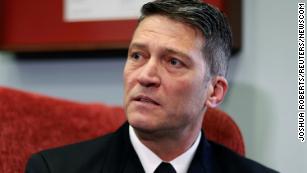
But White House officials said that Jackson had far less help preparing for his confirmation than Cabinet nominees typically get, with one source telling CNN that the White House was “stretched thin” due to the other nominations making their way through the Senate, including Mike Pompeo’s nomination for secretary of state and, his replacement at the CIA, Gina Haspel.
The source said three lower-level aides from the White House communications shop and a few others from the Legislative Affairs Office helped oversee preparations for Jackson’s nomination.
“But that was it,” the source noted, adding that the communications staff at the VA “basically sat on their hands” and refused to help throughout the process because they knew they could lose their jobs once a new secretary took over the agency.
Bipartisan concerns grew on Capitol Hill earlier this week about Jackson’s conduct on the job. And the White House moved to defend Jackson against what they called false accusations. Jackson indicated repeatedly to reporters that he intended to stay the course even as negative headlines mounted.
Speaking at a Tuesday news conference alongside the president of France, President Donald Trump robustly defended Jackson as “one of the finest people I have met,” but said that Democrats had launched an unfair attack on the White House physician’s record.
He also hinted that Jackson may well not continue in the process — and seemed to give him a window to leave.
“I don’t want to put a man through a process like this,” Trump said. “The fact is, I wouldn’t do it. What does he need it for?”
On Tuesday, the top senators on the Veterans Affairs committee announced that they would postpone a confirmation hearing for Jackson scheduled the next day, pending further information. And they took an unprecedented step of writing a letter to the President, requesting “any and all communication” between the Pentagon, the White House Military Office and the White House Medical Unit “regarding allegations or incidents” involving Jackson dating back to 2006, the year he was tapped to serve as a White…

